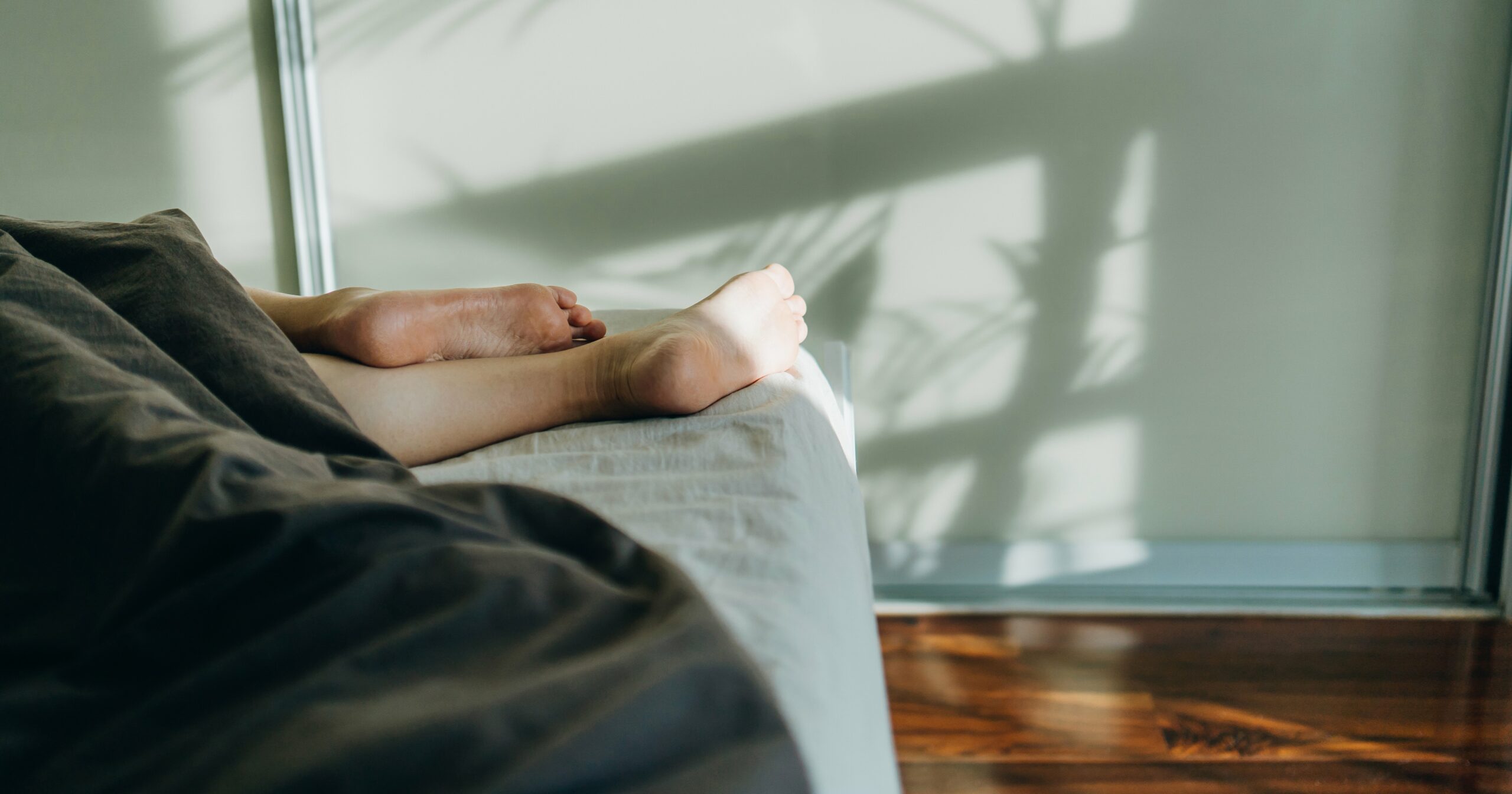I was going through a sexual dry spell the first time I ever experienced an orgasm in my sleep. It may have been because I was between relationships at the time, or maybe because I had an incredible sex dream. Either way, I distinctly remember waking up to slickness between my legs and the tingly euphoria feeling in my vulva. It’s like something shifted in me that night, and ever since, I experience orgasmic sleep, or what I like to call a sleepgasm, a few times a month.
Also known as being wet dreams, nocturnal emissions, or nighttime emissions, Kinsey-certified sexologist and sex researcher Tara Suwinyattichaiporn (aka “Dr. Tara”), PhD, says my experience orgasming in sleep is far from unique. In fact, it’s actually a very real, very common experience.
“It usually happens in relation to a sex dream, but sometimes, it can just be a visceral response to the person’s sexual eagerness or horniness,” Dr. Tara explains. It’s also extremely healthy, extremely pleasurable, and extremely common across the gender spectrum. (Yup, if you’re asking yourself, “Wait, do women have wet dreams?” the answer is yes.)
Whether you’re used to having sex dreams that lead to orgasming in your sleep or you’re totally new to the concept of nighttime emissions, here’s everything you need to know about getting off while sleeping.
What Is Orgasmic Sleep?
As you might have guessed, orgasmic sleep is having an orgasm in your sleep, but there are many other terms for it like wet dream, nocturnal emission, and nighttime emission. It describes the sexual pleasure you feel when hooking up with a partner or engaging in a little masturbation session, but without lifting a conscious finger or a vibrator. The dream, right?
While the concept is pretty straightforward, the actual experience can vary depending on the person. Some folks simply feel a dopamine rush after having a sex dream, Dr. Tara explains, while others might literally have an orgasm to the point that their body reacts with vaginal wetness or pre-cum.
Even though it might seem kinda mythical to wake up feeling like you just got it on, ob-gyn Tiffany Pham, MD, medical advisor for Flo, says it’s actually pretty common. “About 40 percent of people with vaginas experience an orgasm in their sleep at some point in their lives,” she says, and over 51 percent of married women have sex dreams, according to the American Psychological Association.
Orgasmic sleep usually occurs as a result of having a sexually arousing dream (like the ones you have after reading erotic short stories), but they can also happen during periods of high stress, anxiety, or repression. For example, some of my best wet dreams have happened during a sexual dry spell in real life.
What’s the Difference Between Orgasmic Sleep, a Wet Dream, and Nocturnal Emission?
Even though you might not be familiar with the terms “orgasmic sleep” or “nocturnal emissions,” chances are, you’ve heard of wet dreams. Although they’re all similar (and sometimes used interchangeably), there are actually slight nuances to the terms and what they describe.
Very simply, “wet dreams” are typically more gender specific, Pham says, and are associated with people with penises in adolescence who ejaculate in their sleep. However, women can have wet dreams as well. Nocturnal emission is the “medical term for ‘wet dreams,'” she explains, “which refers to spontaneous orgasm and the resultant ejaculation that occurs.”
Orgasmic sleep, on the other hand, is more gender neutral and doesn’t always include ejaculation or vaginal wetness. While it might result in a wet dream, nocturnal emission, or vaginal ejaculation, it can also just be the feeling of orgasm and subsequent flow of feel-good hormones.
Can You Prevent Yourself From Orgasming in Sleep?
Since orgasming in sleep is involuntary, preventing it isn’t exactly easy or guaranteed. If you’ve ever tried to lucid dream or avoid a nightmare, you might know how hard it is to control your subconscious. And honestly, it’s important to ask yourself why you want to put a stop to that pleasure in the first place.
“This is not an uncommon experience, nor should there be any shame attached to the phenomenon,” Pham stresses. Since sex dreams are a normal way for our subconscious to work through issues, organize thoughts, and discover unearthed needs, it’s nothing to be ashamed of.
That said, the brain is programmable, and there might be situations where you’d rather avoid making a mess of the sheets or unknowingly moaning like a banshee in bed (like, say, if you have a roommate or are on a family vacay).
If you’re trying to keep your sleeping self celibate, Dr. Tara suggests avoiding sexual content before bed and maybe even hopping in a cold shower since it can decrease sensitivity in the genital area.
Unless your provider says your orgasmic sleep is a medical concern, the occasional sleepgasm is actually pretty great. If you’re worried that it could be a form of microcheating, don’t. Both experts stress that orgasming during sleep doesn’t mean you’re unfaithful, and it doesn’t necessarily mean you want to have sex with whoever made you orgasm in your sleep.
“Human sexuality is vast, and the dream state is widely accepted as normal and common,” sex therapist Neha Bhat adds. “In instances where cheating has previously taken place, however, it is common for partners to feel threatened by another’s sleepgasm.” If that’s the case, communicating with your partner and working with a couples or sex therapist could help ease your concerns.
Bottom line: Unless orgasming in your sleep is causing a major disruption to your life, there’s nothing wrong with simply enjoying the euphoria. Think of it as a sexy little gift from your subconscious.
Can You Make Yourself Orgasm In Your Sleep?
If the notion of getting off while getting some sleep sounds delightful, you’re in luck. While getting your sleeping self to do what you want isn’t exactly easy, the mind can be trained, so learning to experience orgasmic sleep is possible.
Bhat suggests listening to audio porn before bed (or consuming your fave form of erotic content), and Dr. Tara adds that sleeping on your stomach can also help since it puts friction on your erogenous zones. Another tip is to masturbate before going to sleep but stopping juuuust before you orgasm (also called edging). Think of it as foreplay, but instead of getting turned on for sex, you’re getting turned on for bed.
Something else Pham says might increase your chances of getting an orgasm during sleep is simply being open to the idea. “Research suggests that when women are aware of the concept of a sleep orgasm, have more liberal attitudes regarding sex, or generally have a positive attitude regarding sleep orgasms, there tends to be a higher frequency of experiencing sleep orgasms.” While that might not be what gets you off at night, it might help you in your orgasmic sleep quest.
And if you do manage to climax in your sleep, Dr. Tara says to celebrate it. “It means you have an active sexual imagination, which is important for your overall sexual wellbeing.” Alternatively, if you don’t ever learn to orgasm in your sleep, NBD. That’s what reality is for.
Rachel Varina is a full-time freelance writer covering everything from the best vibrators (the OG Magic Wand) to the best TV shows (“The Vampire Diaries”). She has more than a decade of editorial experience with bylines at Cosmopolitan, Elite Daily, Betches, and more



